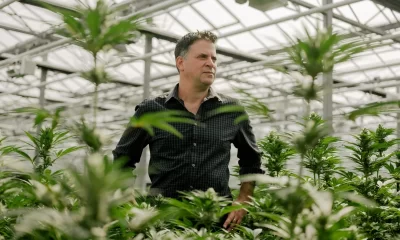Business
Get an Ounce of Legal Weed in Michigan for $122 – The Race to the Bottom Continues Across America

Cannabis markets are saturated with illicit and legal suppliers, as well as hemp-derived Delta-8
In January, cannabis prices in Michigan reached all-time lows, which is terrific for customers and retailers but has smaller cultivators panicking. Retailers have $122 ounces listed in their licensed shops.
Cannabis supply is pulling down prices a lot, and customers purchase it at record rates. State records show there is 55 times more weed in the market, and consumers are buying it at 16 times the price since two years ago when cannabis hit the market. Rates are now lower than 30 or 40 years ago when weed was illegal. On average the price for 28 grams an ounce fell 70% from $516 in December 2019 to $152 this January.
In Kalamazoo, some dispensaries are selling an ounce for as low as $50, while in Michigan, the average price of a gram is $5, less than 50% of the national average.
GROWTH IN THE CANNABIS MARKET
Executive director of the Michigan Marijuana Regulatory Agency, Andrew Brisbo, said the jargon around the market now is growth, but he reckons they are going into a stage where the supply and prices are satisfying demand, and it is stabilizing.
Michigan has evolved rapidly to become the fourth biggest cannabis market in the country, having sales of $1.8 billion in 2021. In November 2018, recreational cannabis was legalized by voters, but the state took another year to put the licensing framework in place for sales.
As consumers enjoy the lower rates, mid and small-sized cultivators state it is difficult for them to equal the prices of bigger operations.
Rivalry among cannabis farmers is growing as new cities permit operations. The number of cities allowing cannabis businesses in the last year jumped from 87 to 118, while the number of authorized businesses jumped by almost 150 to 1,238. People like Haley Poag of East Lansing, who had resisted purchasing cannabis from dispensaries to avoid Michigan’s 10% marijuana excise tax, are drawn in by the costs. Poaga said she has accounts with a few of the local dispensaries, so she receives SMS when they’re running specials, and that’s always when she buys.
Owner of the Lake Effect and Doja dispensaries in Portage, Justin Palmatier, claimed that dealers could purchase marijuana for less money and boost sales. Competitors promptly matched his dispensary’s $5 per gram price reduction. Several rivals lowered their prices to $75 after Lake Effect started selling an ounce for $100, or 28 grams, Palmatier claimed. We must meet or outperform local competitors’ pricing reductions; when prices fall, we begin racing to the bottom. Palmatier added.
According to Chris Krestchmer, general manager of Homegrown Cannabis Company in Lansing, which cultivates marijuana for wholesale and sells it at retail, larger marijuana growing companies are springing up more frequently, pushing out smaller businesses.
In just two years, the number of farmers has risen dramatically to 1,238. Of that number, 458 are larger operations with a capacity of 2,000–10,000 plants or Class C growers. State records show that the amount of weed in the market leaped to over 1, 273,453 pounds, producing a market that is over-saturated.
Krestchmer said they knew it was on its way, but it came faster and more forcefully than anyone expected, and it had become a difficult game for them.
Some farms’ owners worked with local governments to amend legislation that permitted them to combine numerous permits to produce even more marijuana, like the enormous farm slated to be built in Lawrence, southwest Michigan.
Until additional localities permit the opening of marijuana shops or the state caps the number of licenses a grower can have concurrently, according to Krestchmer, farmers will continue to struggle.
THE STATE OF CANNABIS IN MICHIGAN
Although the state now permits local governments to control how much cannabis is grown in their communities, nearly 80% of Michigan cities prohibit the selling of marijuana. Cities, particularly struggling ones, are motivated by economic factors to permit larger businesses.
Compared to the other 18 states that have completely legalized marijuana, Michigan has one of the lower marijuana sales taxes at 10%, which is paid on top of the regular sales tax of 6%. For instance, tax is 37% in Washington but only 16% in Arizona.
Taxes on cannabis sales were anticipated to have brought in $250 million to Michigan last year. Each county and city receives 15% of the excise tax. A major business can bring in $200,000, or twice the annual budget of a small municipality like Lawrence.
Seeing larger (growers) go in and produce thousands of square feet of product at reduced prices compels everyone else to follow that price, according to Palmatier. He added that the smaller businesses wouldn’t realize they couldn’t compete at that pricing point until it was too late. Thus, they could end up ceasing operations.
Palmatier is worried that when larger companies boost their prices when the price reaches a bottom, the market would be limited due to the closure of smaller cannabis operations. Palmatier said he thinks they will see lesser options at higher prices from these bigger organizations.
DIFFERENT PRODUCT TYPES HAVE EXPERIENCED SIMILAR TRENDS AS WELL
Vape cartridge sales in Michigan increased 178 percent between June 2021 and June 2022, making them the second-highest monthly sales item. Last month, sales of that product totaled more than $35 million.
A 91% rise from June of the previous year saw Michigan dispensaries sell over 179,000 pounds of cannabis-infused edibles in June 2022. Last month, retail sales of edibles amounted to more than $19 million.
Concentrates, on the other hand, had a 150% increase in sales volume from June 2021 to June 2022; last month, they generated more than $10 million in sales for adult usage. Ultimately, Michigan dispensaries are on track to record sales of adult-use cannabis totaling more than $1.7 billion across all product categories this year.
BOTTOM LINE
The fall in the price of marijuana is a result of the excess availability or over supply of the plant or cannabis products. It was brought about by bigger businesses combining multiple licenses, thus being able to grow larger quantities of weed. With so much to supply and a standard demand rate, the prices of cannabis had to drop, and competition in the market declined the price further still.
Business
New Mexico cannabis operator fined, loses license for alleged BioTrack fraud

New Mexico regulators fined a cannabis operator nearly $300,000 and revoked its license after the company allegedly created fake reports in the state’s traceability software.
The New Mexico Cannabis Control Division (CCD) accused marijuana manufacturer and retailer Golden Roots of 11 violations, according to Albuquerque Business First.
Golden Roots operates the The Cannabis Revolution Dispensary.
The majority of the violations are related to the Albuquerque company’s improper use of BioTrack, which has been New Mexico’s track-and-trace vendor since 2015.
The CCD alleges Golden Roots reported marijuana production only two months after it had received its vertically integrated license, according to Albuquerque Business First.
Because cannabis takes longer than two months to be cultivated, the CCD was suspicious of the report.
After inspecting the company’s premises, the CCD alleged Golden Roots reported cultivation, transportation and sales in BioTrack but wasn’t able to provide officers who inspected the site evidence that the operator was cultivating cannabis.
In April, the CCD revoked Golden Roots’ license and issued a $10,000 fine, according to the news outlet.
The company requested a hearing, which the regulator scheduled for Sept. 1.
At the hearing, the CCD testified that the company’s dried-cannabis weights in BioTrack were suspicious because they didn’t seem to accurately reflect how much weight marijuana loses as it dries.
Company employees also poorly accounted for why they were making adjustments in the system of up to 24 pounds of cannabis, making comments such as “bad” or “mistake” in the software, Albuquerque Business First reported.
Golden Roots was fined $298,972.05 – the amount regulators allege the company made selling products that weren’t properly accounted for in BioTrack.
The CCD has been cracking down on cannabis operators accused of selling products procured from out-of-state or not grown legally:
- Regulators alleged in August that Albuquerque dispensary Sawmill Sweet Leaf sold out-of-state products and didn’t have a license for extraction.
- Paradise Exotics Distro lost its license in July after regulators alleged the company sold products made in California.
Golden Roots was the first alleged rulebreaker in New Mexico to be asked to pay a large fine.
Source: https://mjbizdaily.com/new-mexico-cannabis-operator-fined-loses-license-for-alleged-biotrack-fraud/
Business
Marijuana companies suing US attorney general in federal prohibition challenge

Four marijuana companies, including a multistate operator, have filed a lawsuit against U.S. Attorney General Merrick Garland in which they allege the federal MJ prohibition under the Controlled Substances Act is no longer constitutional.
According to the complaint, filed Thursday in U.S. District Court in Massachusetts, retailer Canna Provisions, Treevit delivery service CEO Gyasi Sellers, cultivator Wiseacre Farm and MSO Verano Holdings Corp. are all harmed by “the federal government’s unconstitutional ban on cultivating, manufacturing, distributing, or possessing intrastate marijuana.”
Verano is headquartered in Chicago but has operations in Massachusetts; the other three operators are based in Massachusetts.
The lawsuit seeks a ruling that the “Controlled Substances Act is unconstitutional as applied to the intrastate cultivation, manufacture, possession, and distribution of marijuana pursuant to state law.”
The companies want the case to go before the U.S. Supreme Court.
They hired prominent law firm Boies Schiller Flexner to represent them.
The New York-based firm’s principal is David Boies, whose former clients include Microsoft, former presidential candidate Al Gore and Elizabeth Holmes’ disgraced startup Theranos.
Similar challenges to the federal Controlled Substances Act (CSA) have failed.
One such challenge led to a landmark Supreme Court decision in 2005.
In Gonzalez vs. Raich, the highest court in the United States ruled in a 6-3 decision that the commerce clause of the U.S. Constitution gave Congress the power to outlaw marijuana federally, even though state laws allow the cultivation and sale of cannabis.
In the 18 years since that ruling, 23 states and the District of Columbia have legalized adult-use marijuana and the federal government has allowed a multibillion-dollar cannabis industry to thrive.
Since both Congress and the U.S. Department of Justice, currently headed by Garland, have declined to intervene in state-licensed marijuana markets, the key facts that led to the Supreme Court’s 2005 ruling “no longer apply,” Boies said in a statement Thursday.
“The Supreme Court has since made clear that the federal government lacks the authority to regulate purely intrastate commerce,” Boies said.
“Moreover, the facts on which those precedents are based are no longer true.”
Verano President Darren Weiss said in a statement the company is “prepared to bring this case all the way to the Supreme Court in order to align federal law with how Congress has acted for years.”
While the Biden administration’s push to reschedule marijuana would help solve marijuana operators’ federal tax woes, neither rescheduling nor modest Congressional reforms such as the SAFER Banking Act “solve the fundamental issue,” Weiss added.
“The application of the CSA to lawful state-run cannabis business is an unconstitutional overreach on state sovereignty that has led to decades of harm, failed businesses, lost jobs, and unsafe working conditions.”
Business
Alabama to make another attempt Dec. 1 to award medical cannabis licenses

Alabama regulators are targeting Dec. 1 to award the first batch of medical cannabis business licenses after the agency’s first two attempts were scrapped because of scoring errors and litigation.
The first licenses will be awarded to individual cultivators, delivery providers, processors, dispensaries and state testing labs, according to the Alabama Medical Cannabis Commission (AMCC).
Then, on Dec. 12, the AMCC will award licenses for vertically integrated operations, a designation set primarily for multistate operators.
Licenses are expected to be handed out 28 days after they have been awarded, so MMJ production could begin in early January, according to the Alabama Daily News.
That means MMJ products could be available for patients around early March, an AMCC spokesperson told the media outlet.
Regulators initially awarded 21 business licenses in June, only to void them after applicants alleged inconsistencies with how the applications were scored.
Then, in August, the state awarded 24 different licenses – 19 went to June recipients – only to reverse themselves again and scratch those licenses after spurned applicants filed lawsuits.
A state judge dismissed a lawsuit filed by Chicago-based MSO Verano Holdings Corp., but another lawsuit is pending.
Source: https://mjbizdaily.com/alabama-plans-to-award-medical-cannabis-licenses-dec-1/
-

 Business2 years ago
Business2 years agoPot Odor Does Not Justify Probable Cause for Vehicle Searches, Minnesota Court Affirms
-

 Business2 years ago
Business2 years agoNew Mexico cannabis operator fined, loses license for alleged BioTrack fraud
-

 Business2 years ago
Business2 years agoAlabama to make another attempt Dec. 1 to award medical cannabis licenses
-

 Business2 years ago
Business2 years agoWashington State Pays Out $9.4 Million in Refunds Relating to Drug Convictions
-

 Business2 years ago
Business2 years agoMarijuana companies suing US attorney general in federal prohibition challenge
-

 Business2 years ago
Business2 years agoLegal Marijuana Handed A Nothing Burger From NY State
-

 Business2 years ago
Business2 years agoCan Cannabis Help Seasonal Depression
-

 Blogs2 years ago
Blogs2 years agoCannabis Art Is Flourishing On Etsy













